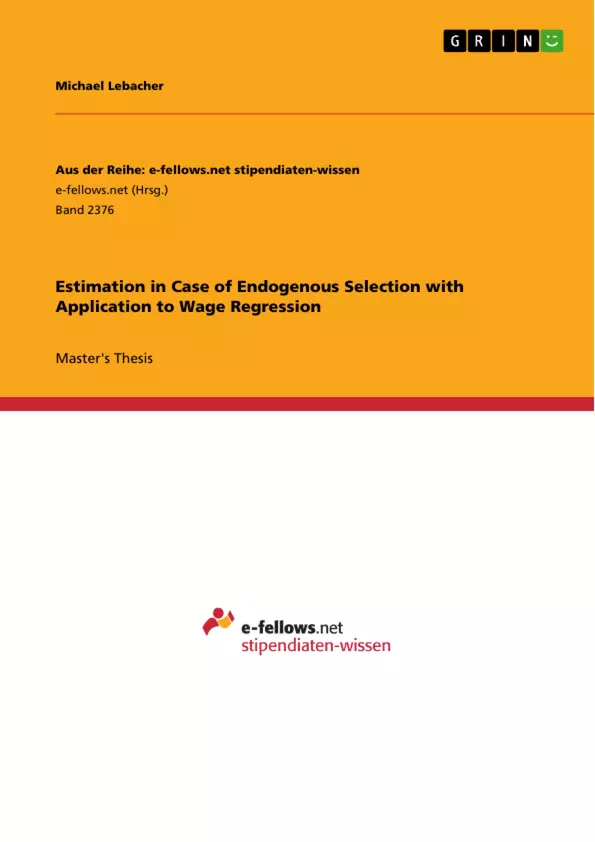This thesis addresses the problem of linear regression estimation with selectively observed response data when selection is endogenous.
The approach relies critically on the existence of an instrument that is independent of the selection, conditional on potential outcomes and other covariates. A parametric two-step estimation procedure its proposed. In a
first step the probability of selection is estimated employing a generalized method of moments estimator. The second step uses the estimated probability weights in order to perform an inverse probability weighted least squares estimation. Two potential estimators are presented and expressions for their asymptotic variance-covariance matrices are provided.
As an extension, it is shown how the concept could be used in multiple period setup, using a pooled weighted least squares estimator. Finite sample properties are illustrated in a Monte Carlo simulation study. An empirical illustration is given, using the Survey of Health, Ageing and Retirement in Europe dataset, applying the theory to wage regressions.
All proofs and background for mathematical statements are provided in the extensive Annex.
Inhaltsverzeichnis (Table of Contents)
- 1 Introduction
- 2 Theory and Models
- 2.1 Literature Review and General Theory
- 2.2 Application to the Linear Model in a Cross-Sectional Setting
- 2.3 Testability of the Independence Condition
- 2.4 Application to the Linear Model in a Pooled OLS Setting
- 3 Simulations
- 3.1 Cross-Sectional Simulations
- 3.2 Pooled OLS Simulations
- 3.3 Sargan-Hansen J-Test Simulations
- 3.4 Conclusions from the Simulations
- 4 Data and Statistical Analysis
- 4.1 Empirical Literature Review
- 4.2 Data Description, Variables and Manipulations
- 4.3 Statistical Analysis
- 5 Conclusions
Zielsetzung und Themenschwerpunkte (Objectives and Key Themes)
This thesis tackles the challenge of estimating linear regression models in situations where the response data is selectively observed and the selection process is endogenous. The focus lies on a parametric two-step estimation procedure that leverages an instrument independent of selection, conditional on potential outcomes and other covariates. The goal is to present and analyze estimators for this setting, including their asymptotic variance-covariance matrices, and to demonstrate their applicability in both cross-sectional and pooled OLS settings.
- Endogenous Selection in Linear Regression
- Two-Step Estimation Procedure
- Instrumental Variables and Independence Condition
- Asymptotic Properties of Estimators
- Application to Wage Regressions
Zusammenfassung der Kapitel (Chapter Summaries)
- Chapter 1: Introduction provides a general overview of the research problem and introduces the key concepts of endogenous selection and instrumental variables. It outlines the structure of the thesis and highlights the contribution of the work.
- Chapter 2: Theory and Models delves into the theoretical framework of the research. It reviews relevant literature and presents the general theory of endogenous selection in regression models. This chapter further details the application of this theory to linear models in both cross-sectional and pooled OLS settings. It also explores the testability of the independence condition.
- Chapter 3: Simulations focuses on assessing the finite sample properties of the proposed estimators through Monte Carlo simulations. It examines the performance of the estimators in various scenarios and explores the behavior of the Sargan-Hansen J-test.
- Chapter 4: Data and Statistical Analysis presents an empirical application of the developed theory. It reviews relevant empirical literature, describes the dataset used (Survey of Health, Ageing and Retirement in Europe - SHARE), and provides detailed information about the variables and their manipulations. This chapter culminates in the statistical analysis of the chosen data using the developed methods.
Schlüsselwörter (Keywords)
Endogenous Selection, Instrumental Variables, Two-Step Estimation, Generalized Method of Moments (GMM), Inverse Probability Weighting (IPW), Linear Regression, Cross-Sectional Data, Pooled OLS, Monte Carlo Simulations, Sargan-Hansen J-Test, Wage Regressions, Survey of Health, Ageing and Retirement in Europe (SHARE).
Frequently Asked Questions
What is endogenous selection in linear regression?
It refers to situations where the process of observing data (selection) is related to the unobserved factors affecting the outcome, leading to biased estimates.
What estimation procedure is proposed in this thesis?
A parametric two-step procedure: first estimating selection probability via GMM, then performing an inverse probability weighted least squares (IPW) estimation.
What is the "independence condition" mentioned?
The approach relies on an instrument that is independent of the selection process, conditional on potential outcomes and other covariates.
How is the theory applied empirically?
The theory is applied to wage regressions using the Survey of Health, Ageing and Retirement in Europe (SHARE) dataset.
Can this method be used for panel data?
Yes, the thesis extends the concept to a multiple period setup using a pooled weighted least squares estimator.
- Quote paper
- Michael Lebacher (Author), 2016, Estimation in Case of Endogenous Selection with Application to Wage Regression, Munich, GRIN Verlag, https://www.grin.com/document/369392



